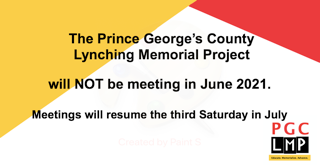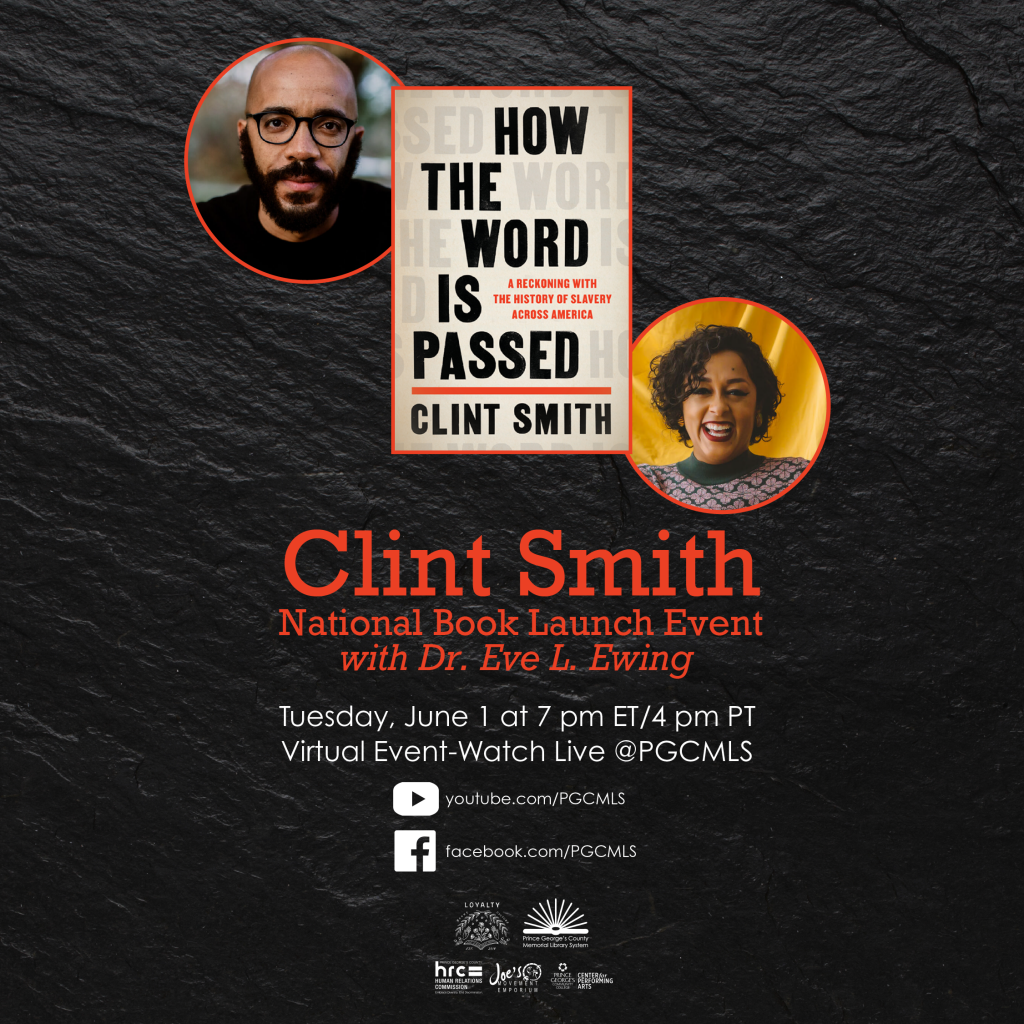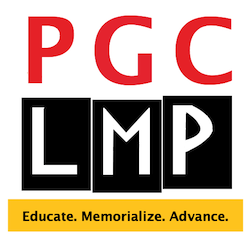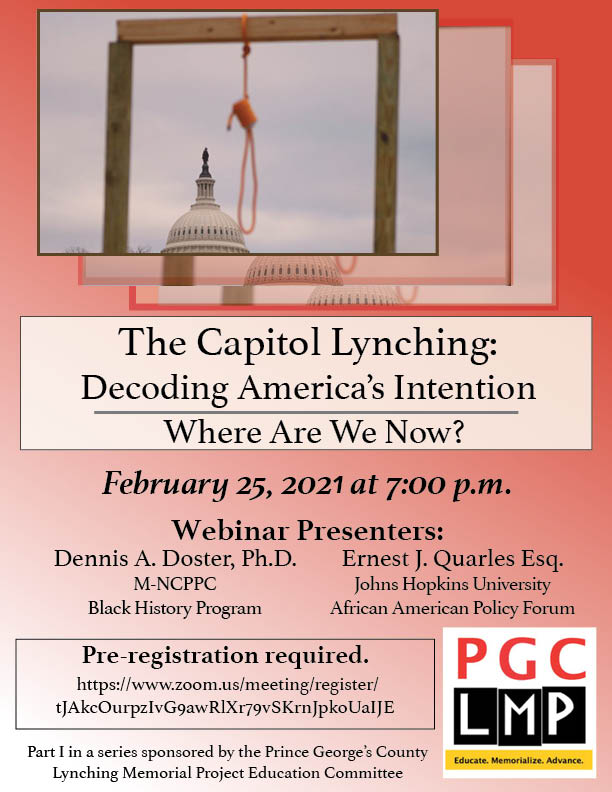Eighth graders at Loch Raven Technical Center produced a powerful film about the Untold Story of Maryland lynchings.
Juneteenth Events

In honor of Juneteenth, the Prince George’s County Lynching Memorial Project will NOT be meeting this month. Look for our next meeting in July.
To encourage all to take advantage of Juneteenth events, please see the options below.
Juneteenth Public Events
In person: City of Greenbelt activities Friday night June 18th and Saturday 19th (see flyer), co-sponsored by Greenbelt Black History and Culture Committee (co-chaired by PGC LMP members Dr. Lois Rosado and Leeann Irwin).
On-Line: Afro-American Historical and Genealogical Society-Prince George’s County, Maryland Chapter (AAHGS-PGCM) Juneteenth | AAHGS | PG County
Also:
Parks and Planning may do a virtual Juneteenth event (Check site for details: http://www.pgparks.com/780/Juneteenth)
PG County Library offers several events this month (Check site for details: https://www.pgcmls.info/juneteenth )
National Book Launch Event featuring Clint Smith

The Prince George’s County Lynching Memorial Project is excited to promote and support this National Book Event featuring author Clint Smith’s new release. More details in the flyer above. Please help spread the word as we grapple with history.
Next General Meeting: 5/15/2021, 2 PM
The next meeting of the Prince George’s County Lynching Memorial Project is Saturday, May 15, 2021 at 2:00 p.m.
There will be a special presentation by Elinor Thompson on The Importance of Preserving Church and Cemetery Records for Historical Research.
The zoom link and agenda are below.
April minutes are attached for your information and review.
We look forward to seeing you there.
Topic: PGC LMP May 2021 General Meeting
Time: May 15, 2021 02:00 PM Eastern Time (US and Canada)
Join Zoom Meeting
https://uuma.zoom.us/j/93246777560
Meeting ID: 932 4677 7560
One tap mobile
+13017158592,,93246777560# US (Washington DC)
+13126266799,,93246777560# US (Chicago)
General Meeting Agenda
Saturday, May 15th, 2021
2:00 PM – 4:00 PM
1. Call to Order – Krystina Tucker, Co-Chair
2. Welcome and Review Meeting Process via Zoom Krystina
3. Calling of Names –
Thomas Juricks, 1869, Piscataway; John Henry Scott, 1875, Oxon Hill; Michael Green, 1878, Upper Marlboro; Stephen Williams, 1894, Upper Marlboro.
4. Review of Minutes – Crystal Carpenter, Co-Chair
5. Maryland Lynching Memorial Project Liaison Update – Lula Beatty (5 minutes)
6. State of Maryland Lynching Truth and Reconciliation Commission Liaison Update – Omar Eaton-Martinez
7. Introductions of any Newcomers and Guests
8. Special Presentation – “The Importance of Preserving Church and Cemetery Records for Historical Research” by Elinor Thompson – Maryland Commissioner on African American History and Culture (Anne Arundel County), Genealogist, Historian, Author, and Cemetery Preservationist
9. Committee Breakout Rooms (30 minutes)
10. Committee Reports Krystina (20 minutes)
a. Community Remembrance Projects (formerly Soil Collection) – Anita Brown, Jade Eaton
b. Education – Crystal Carpenter, Liz Muller
c. Outreach – Rev. Nathan HIll, Rev. Aaron Tinch
d. History/Genealogy – Krystina Tucker, Jody Wildy
11. Follow-up Discussion on Reports (as needed)
12. Announcements/Questions (5 minutes)
13. Closing
Next General Meeting: Saturday, June 19th, 2-4 pm
MCAAHC / MLTRC Joint Statement on Racial Injustice & Social Equity
Please see the following statement on Racial Injustice & Social Equity from our partners at Maryland Commission on African American History and Culture and Maryland Lynching Truth and Reconciliation Commission.
A major lesson from history is that those who do not learn from the past are destined to repeat it. Financial and political power built upon systems driven by racial oppression does not make a sound foundation on which to forge and advance a humane, sustainable future for the United States, and the majority of people in this country are voicing that statement. Maryland, like the United States, has a profound and tortured relationship with systemic racism, and as a result, this state has been an epicenter for protests and calls for Black liberation: from the abolitionist movement to innovations in the arts, education, and civil rights legislation. The legacy continued in 1969 with the MCAAHC, and in 2019 with the MLTRC.
You can download the full statement here:
Article: Why does the Myth of the Confederate Lost Cause Persist?
Part of our work as the PGCLMP is to name the truth.
This article from author Clint R. Smith III, an excerpt from his recent book, is featured in the upcoming issue of The Atlantic as part of their Inheritance series. He gives an overview of the Lost Cause myth that persists in the minds of many Americans and the ways the truth about slavery, Confederate monuments, and the Civil War are obscured.
Gramling then turned his attention to the present-day controversy about Confederate monuments—to the people who are “trying to take away our symbols.” In 2019, according to a report from the Southern Poverty Law Center, there were nearly 2,000 Confederate monuments, place names, and other symbols in public spaces across the country. A follow-up report after last summer’s racial-justice protests found that more than 160 of those symbols had been removed or renamed in 2020.
Gramling said that this was the work of “the American ISIS.” He looked delighted as the crowd murmured its affirmation. “They are nothing better than ISIS in the Middle East. They are trying to destroy history they don’t like.”
Calling All Volunteers
On Saturday, March 27 from 11 AM – 3 PM, there is an opportunity for volunteers to explore history and give back at a clean up day for the Tanyard/Franklin Cemetery. Please see the attached flyer for the items to bring and what to expect from this opportunity which will include history about the cemetery. Refreshments will also be provided.
See the flyer below for more details:
Watch the Capitol Lynching Webinar
If you missed our recent webinar, you are in luck. You can watch it below or on our new Youtube channel.
“The Capitol Lynching” Webinar
Join us Thursday, February 25 at 7 p.m. for Part I of a webinar series organized by our Education Committee.
“The Capitol Lynching: Decoding America’s Intention. Where Are We Now?” will provide a brief overview of historical lynchings in the U.S. and specifically Prince George’s County and the consequences for both Black and white communities, while taking a look at the events on Jan. 6 as they relate to the history of lynching culture and the continuing problems of race-baiting hate, disenfranchisement and exclusion. We will also examine the U.S.’s current commitment to ensuring racial equity and justice.
Attendance is free but pre-registration is required: https://www.zoom.us/…/tJAkcOurpzIvG9awRlXr79vSKrnJpkoUaIJE
Action Alert: Pass the Emmett Till Antilynching Act
“Our country’s national crime is lynching.”
Ida B. Wells

After more than 100 years of unsuccessful legislative efforts to make lynching a federal offense, it’s time for justice for the victims of lynching and their communities. The Emmett Till Antilynching Act awaits approval. Your help is needed to push it through.
• Over 6400 people were lynched between 1865 and 1968, and most were African Americans. These numbers represent the documented cases; many others went unrecorded.
• Lynching (murder) is a crime that occurred in every state except four.
• Ninety-nine percent of all lynching perpetrators escaped punishment by state or local officials.
The Emmett Till Antilynching Act will make lynching a federal hate crime, allowing federal intervention and guidelines in charging, prosecuting, and sentencing perpetrators of lynching.
The bill was reintroduced by the House on January 4, 2021.
Why Support This Bill. No matter how old the crime, victims of lynching and their families deserve justice. Moreover, lynching continues and remains a threat as seen by the events of January 6, 2021.
What You Can Do. Contact your senators and representatives to urge them to vote for H.R. 55 – Emmett Till Antilynching Act. See the list of MD representatives with their contact information in the attached PDF file.

